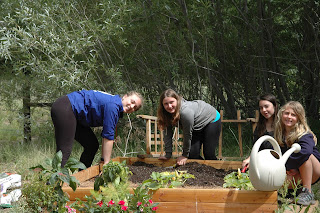In order to explain these “results” we could be looking
into how theory and practice intertwine at camp. At
Gilboa (and other Habonim camps), a significant emphasis is placed on theory – education
– and campers engage every day in issues pertaining to society, economy, Jewish
identity, and Israel. They learn about their responsibility to making the world
a better place.
However, that alone is probably not enough to explain the study results. The added
layer is what campers do. At Gilboa, everyone takes responsibility for the function and
success of the community. Every morning campers participate in Avodah (work) and maintain the physical
site. They wash the morning dishes, prepare salad for lunch, sanitize and clean
the bathrooms, tend to the garden and join building projects. By
doing so, they develop the understanding that a community does not happen on
its own; rather, it needs the intentional investment of each one of its
members in order to function.
Through Avodah (and other programming aspects we'll be discussing in future posts - such as group decision making, responsibility for programming and mentorship), campers learn by experience that they have the power to change, influence and build. They become builders of their own community and creators of their own experiences.
 |
Toranut Boker (washing breakfast dishes)
|
 |
Bop-It Arranging Costumes
|
 |
Briut - The Most Popular Work at Gilboa
|
 |
And Ashpa - collecting trash and recycling
|
 |
Camp Beautification
|
 |
Gan - Gilboa Garden
|
 |
Ranger - Taking Care of Business
|



















Comments